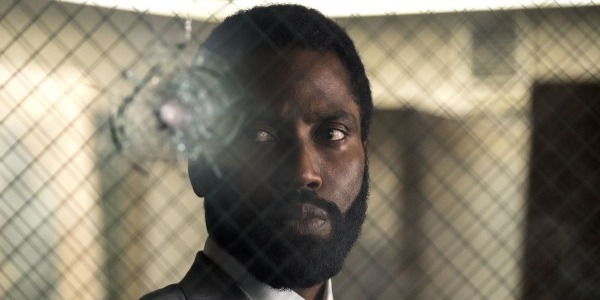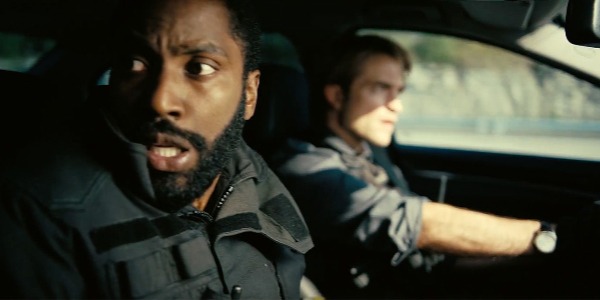TENET: Bonded By Time

Alex is a 28 year-old West Australian who has a…
The act of sitting down in a theatre and actually gazing upon Christopher Nolan’s Tenet is truly a surreal experience. Not because of the time-travelling, paradoxical sci-fi chronology or the IMAX-shot action set-pieces that stretch the theatrical canvas to great lengths, but because of the literal nature of the whole ordeal: sitting down in a cinema and watching an original film being projected. But the major question that lurks behind this endeavour is: is it worth all the fuss?
Remixing the James Bond series (without their self-aware kitsch and cheeky sexuality) with a frenetic field guide to college-grade physics, Nolan’s 11th notch in his belt is his riskiest endeavour yet. But for all of his visual innovations and sporadic moments of truly awe-inspiring blockbuster decadence that he miraculously mounts, the titanic British writer-director finds himself – for the first time since The Dark Knight Rises – submerged beneath the weight of his lofty ambitions, crippled by his autueristic drive to mix the cerebral with the spectacle.
Seemingly forgetting that $200 million dollar juggernauts like this actually need major audiences to prop them up and with theatres on the brink of collapse, the one title that was meant to draw people in is remarkably intent in keeping them out.
Time Is Running Out
As one of the lone rebels against a studio system fiercely determined to clog up cinema space with remakes, franchises and belated sequels, Nolan’s latest work is curiously animated with the same level of old-fashioned nostalgia as the cinematic contemporaries that he’s strived so hard to defy.
For all of its pretentious posturing and palindromic anatomy, the stiff, frosted heart at the centre of this immersive exercise throbs to the tune of Monty Norman’s iconic Bond theme – notably closer to the Terence Young-built traditions of the Connery-era rather then the rugged Daniel Craig updates – from its globe-trotting, silky-smooth espionage escapades, down to its hammy, Russian villain (Kenneth Branagh, who has learned no lessons from Wild Wild West, it seems) who heralds an inexplicable plan to end our world as we know it.

In the same vein as his previous architectural disruptions – Inception and Dunkirk, primarily – Tenet operates like a stainless steel Rolex: sleek aesthetics bolstered by complex mechanics. But rather than a wristwatch that tells you the time, this sci-fi spy flick feels pre-occupied by telling you about the concept of time, rather then what the time actually is.
Nolan, one of the many modern directors trying to emulate Michael Mann’s Heat with different disguises, definitely nails his ornamental minimalism and thunderous gunplay, but he’s never quite nailed his effortless characterisation or snappy ear for dialogue. Thief doesn’t work if you don’t care for James Caan, and Nolan never quite elevates his main players above ‘chess piece’ status.
Inversion, Not Inception
Tenet demonstrates the least amount of effort in this regard – a muted John David Washington (quietly certifying his leading-man potential), is smugly referred to as ‘The Protagonist’, which never sounds like anything outside of a placeholder that Nolan forgot to swap out before shooting began.
Literally kicking off with a bang, Tenet details the Protagonist’s progression from dedicated CIA soldier to jet-setting secret agent, as he pinballs between continents and characters, (including Robert Pattinson’s cryptic but camp British agent) in order to track down the Anglo-Russian (heavy emphasis placed on the first signifier for international box-office purposes) oligarch Andrei Stor (Branagh), who plans on weaponising mystery boxes (once again, the placeholder writing rings true) for a future apocalypse.

This over-simplistic summary is for both spoiler and pejorative purposes; the main draw of the film, “inversion”, as it’s referred to by the first illegible exposition dropper (Clémence Poésy), is often explained and demonstrated, but never quite clarified. In broad strokes, an undetermined future has discovered radioactive materials that travel backward in time, thus appearing reversed through our own linear perception (Think Looper, but more obtuse).
This narrative gimmick is the film’s greatest and weakest element, as it synthesises a rather dull and overly dense MI6 fan-fiction into something sincerely original, but its logistics, which are necessary to understand in order to get who is going where or why, require full pages of delineation to grasp. Nolan’s stone-cold personalities barrel through these info-dumps at full speed – he must’ve seen the “Explain it to me in English please?” memes that frequently populate the realms of Film Twitter.

Not only do these passages of vital information get rushed through with zero vocal elegance or ‘quotable’ distinguishments, but the sound department doubles down on its impenetrable qualities. If dialogue isn’t often obscured by masks, food, or gunfire, then Ludwig Göransson’s room-shaking score ought to bury any important correspondence that might actually help the audience get a grasp as to what’s happening. It worked for the chaotic destruction of Dunkirk, but here it’s absolutely frustrating.
Criticisms of Nolan’s treatment of his female characters are somewhat settled though, but Elizabeth Debicki’s perpetually suffering, art-authenticating housewife role is only coloured by the men in her life – her son and husband, the previously-mentioned moustache-twirling Russian arms dealer – and instead of getting to be the third wheel to Washington-Pattinson’s robust buddy-cop pairing, she is sidelined from the action for long stretches.
Conclusion
When the Protagonist is told that he shouldn’t “try to understand it – feel it”, it’s the closest Christopher Nolan gives us in the way of deciphering his latest, messy addition to his wholly original oeuvre; mystifying, truly ground-breaking sequences of gunfights escalated in reverse or explosions that shrink within themselves punctuate long stretches of drab, dreary deliberations on faith or the convoluted machinations of Kenneth Branagh’s plans for annihilation. Tenet is not a complete disaster, nor is it the messianic blockbuster that will help pull cinemas out of the rubble this year. But in the midst of 2020, an ambitious movie that implores rigorous discussion, whether it be disingenuous, casual, or academic, brings forth nostalgic pleasures of a time that feels so far from us now: a simpler year known as 2019.
Will you brave the cinemas to see Tenet? Let us know in the comments below!
Tenet is currently out in cinemas in Australia and Europe and will be released in the United States on September 3, 2020.
Watch Tenet
Does content like this matter to you?
Become a Member and support film journalism. Unlock access to all of Film Inquiry`s great articles. Join a community of like-minded readers who are passionate about cinema - get access to our private members Network, give back to independent filmmakers, and more.













